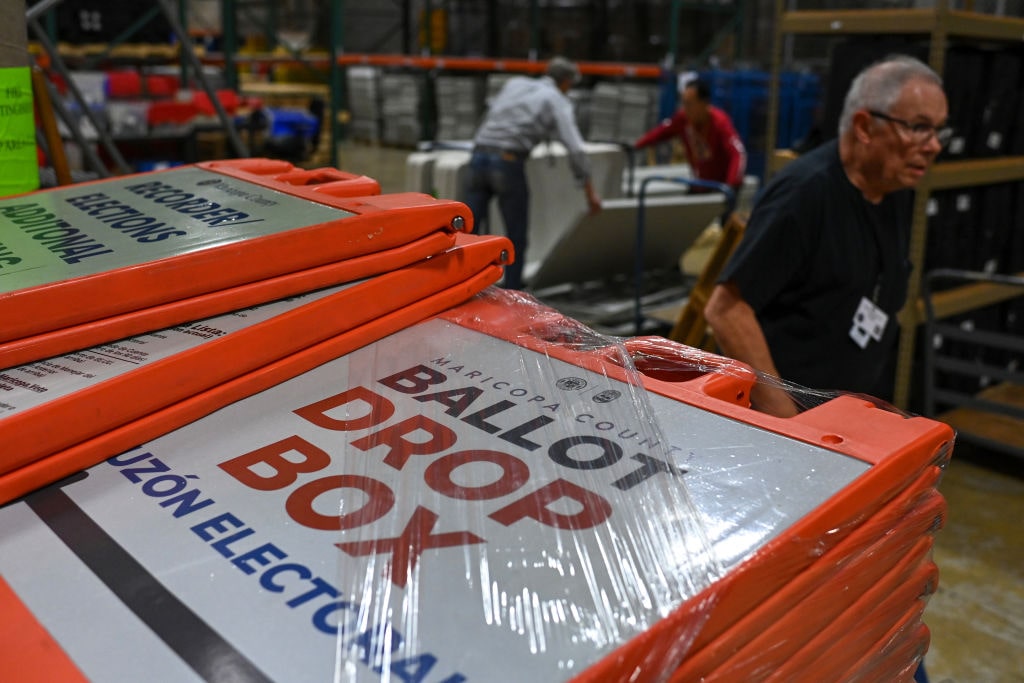The Grand Canyon State gets tough on non-citizen voting and streamlines the counts.
By James Fite | Mar 18, 2024 @ Liberty Nation News, Tags: Articles, Good Reads, Opinion, Politics

The early elections and Super Tuesday have come and gone. With Donald Trump and Joe Biden both having already surpassed the required number of delegates to claim their respective parties’ nominations, it’s all over but the crying. But the primaries and caucuses continue, for a while, at least. Next up on the list of swing states with changing election laws is Arizona.
While the most recent election law likely won’t change who wins the party primaries in the Grand Canyon state tomorrow, March 19, – and certainly won’t alter who makes it to the main stage in November – it does change how votes are counted. Another, far less bipartisan law from 2022 could affect who is able to vote this year – which could make a huge difference in who wins the Arizona electors. Trump won the state in 2016 by just 4.1%, and Biden squeaked by in 2020 with a lead of less than half a percent.
It’s About Time
Back in 2022, the US Congress passed a bill that altered when statewide results must be reported. At the same time, Arizona lawmakers tightened the threshold that triggers automatic recounts in a way that all but guarantees some counties – Maricopa County, especially – will almost always have a recount. That was bad news for the Grand Canyon State, as complying with the new federal deadline became virtually impossible.
The fix came just in time this year. Election directors said the
last possible date to move the primary was February 9; the legislature
passed the bill – almost unanimously, in fact – on February 8.
The new law established certain requirements for how officials must verify voter signatures on mail-in ballots. It also moved up the primary, and shortened just slightly the window voters have to address ballot errors from five business days to five calendar days. The new law does require election officials to prepare their final results more quickly than in previous years, and certifying and reporting said results can’t be postponed for any reason. However, they can now be reported electronically. Previously, election results had to be hand-delivered in Phoenix.
If any county does trigger a recount, a hand count and electronic count can be done simultaneously to speed up the process, and candidates who don’t wish to fight a close call will be allowed to opt out of having the recount completed.
Arizona Aliens
In a far less bipartisan move, the Arizona state legislature of 2022 passed a series of election bills that, among other things, require proof of citizenship for voter registration – which then-Governor Doug Ducey, a Republican, signed into law. Now, the Arizona legislature has been run by Republicans for a long time: Democrats have controlled the state Senate only thrice since 1966 (the elections of ’74, ’76, and ’90), and Republicans have held the House undefeated since ’66. But those majorities have often been slim. In 2022, it was 31-29 in the House and 16-14 in the Senate. So while Republicans held enough votes to pass the bills, the legislation was far from universally welcomed.

The new laws were quickly tied up in court, where a federal judge in Phoenix just recently upheld some parts while blocking others. US District Judge Susan Bolton ruled at the end of February this year that requiring county officials to verify the status of registered voters who haven’t provided proof of citizenship is not discriminatory, as detractors (like various progressive groups and the US Department of Justice) claimed.
Another provision, however, which would have required voters to show proof of US citizenship to participate in federal elections, she ruled violated a federal voter registration law from 1993. Under that law – and a consent decree from 2018 – the state can’t stop people who use a federal registration form, which doesn’t require proof of citizenship, from casting a ballot in federal elections.
So what’s the outcome? Arizona now has a two-tiered voter system. The state will accept the federal registration form, but anyone who doesn’t provide proof of citizenship will only be allowed to vote for president, the US House, and the US Senate. Only those who verify their citizenship can vote in all elections – federal, state, and local.
“The court finds that though it may occur, non-citizen voting in Arizona is quite rare, and non-citizen voter fraud in Arizona is rarer still,” Judge Bolton wrote in her ruling. “But while the voting laws are not likely to meaningfully reduce the possible non-citizen voting in Arizona, they could help to prevent non-citizens from registering or voting.”
While the judge could be correct in her assessment of how often non-citizen voter fraud occurs, she might be wrong. And there are certainly those who believe, or at least suspect, that she is. But even if she’s right, one must wonder just how much fraud constitutes “rare” and “rarer still,” especially when the razor-thin majorities of presidential elections are concerned. For example, Joe Biden took the state by just 0.4%, 1,672,143 to Trump’s 1,661,686.
That’s a margin of just 10,457 votes out of a total of 3,333,829. Some might call anything less than half a percent “rare” – especially in a state that, even according to the DHS Office of Immigration Statistics – has at least 300,000 “undocumented immigrants.”
No comments:
Post a Comment